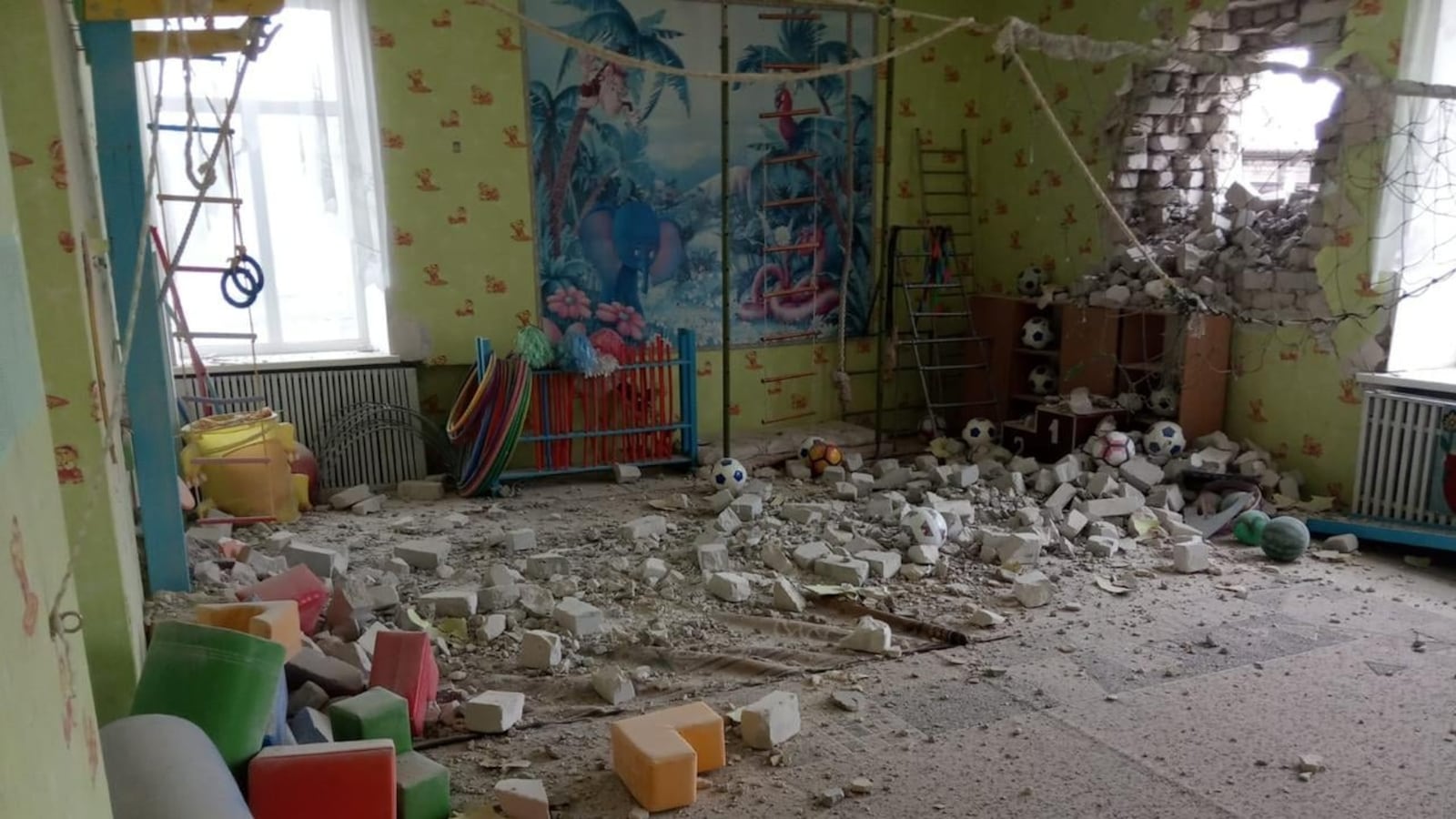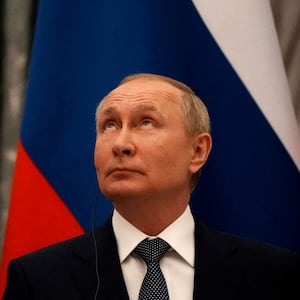A kindergarten in Ukrainian-controlled territory took a direct hit from artillery fire by Russian-backed separatists early Thursday, leaving two teachers injured, authorities said.
The attack comes as tensions have reached a boiling point amid growing fears of a Russian offensive. Intensified fighting has erupted along the frontline and the Kremlin appeared to add fuel to predictions by U.S. officials that it might be seeking a “pretext” to send troops into the country.
The kindergarten in the town of Stanytsya Luhanska—one of the most dangerous places along the battle-scarred frontline—was reportedly full of children at the time of the attack, but they were not said to have been injured. Two teachers were hurt, according to Ukrainskaya Pravda, which cited Ukrainian volunteers. The Ukrainian military’s Joint Forces Operation said civilians in the area had been evacuated in light of the shelling, which it said demonstrated “particular cynicism” by Russian proxies.
Photos from the scene posted by the JFO showed several women taking shelter in a bunker, while what appeared to be the main play area of the kindergarten was destroyed. The wall, decimated by shelling, was left with a gaping hole, and debris was scattered all over the floor next to children’s toys.
British Prime Minister Boris Johnson called the attack “a false flag operation designed to discredit the Ukrainians.” Ukrainian President Volodymyr Zelensky called it a “big provocation.”

The shelling came as monitors from the Organization for Security and Cooperation in Europe reported a surge in ceasefire violations, and a spate of shelling attacks along the frontline on Thursday alone. A school in the town of Vrubivka, in the Luhansk region, was also damaged by shelling Thursday among the intensified attacks. Thirty seven school children were inside at the time a shell sent shrapnel into the building, but they were not injured, according to local reports.
In Maryinka, in the Donetsk region, a woman suffered a shrapnel injury to her hand while at a public bus stop.
Moscow and its proxies in the Donbas, meanwhile, accused Ukrainian forces of acting as the aggressor.
“The situation on the line of contact has sharply escalated. The enemy is making attempts to unleash active hostilities,” leaders of the Donetsk People’s Republic wrote on Telegram.
Dmitry Peskov, Vladimir Putin’s spokesman, warned of a “new outbreak of war in the immediate vicinity of our borders.”
He went on to say that “provocative actions by Ukraine have only intensified along the frontline in recent days,” echoing rhetoric used by the Kremlin in the run-up to the Russian invasion of Georgia in 2008.
While much of the world reacted with relief earlier this week to Moscow’s announcement of a partial troop withdrawal from Ukraine’s borders, Western leaders have warned that the Kremlin actually appears to be sending more troops, and that all indications suggest Russia may unleash a brutal attack on Ukraine by creating a “pretext” for military action.
The Kremlin announced again on Thursday that they were pulling some troops back from the frontline just hours after the U.S. had reportedly characterized the last supposed withdrawal as mere fiction.
Shortly after that, the deputy U.S. ambassador to Russia was expelled from the country in what the State Department described as an unprovoked move. Russia’s TASS news agency reported that deputy ambassador Bart Gorman was ordered out of the country despite having a valid visa.
The expulsion came as the Russian Foreign Ministry released a copy of Moscow’s official response to security proposals by the U.S. and NATO. The document largely reiterated Moscow’s previous complaints that the U.S. had “ignored” its security concerns about the expansion of NATO and eventual entry to the alliance of Ukraine. But it also repeated threats of “military technical measures” in “the absence of the American side’s readiness to come to an agreement on firm, legally binding security guarantees.” The document also called for the halt of weapons supplies to Ukraine, the blocking of Ukrainian troops from NATO training exercises, and the withdrawal of all foreign weapons that were previously provided to Kyiv.
Putin accused Ukrainian authorities of “genocide” earlier this week as lawmakers urged him to recognize the independence of the two occupied territories in Ukraine controlled by pro-Kremlin fighters.
A day before the shelling, Moscow claimed to have found “mass graves” in the Donbas region with hundreds of civilians killed by Ukrainian troops at the height of fighting in 2014.
Echoing allegations that were rampant in Kremlin-controlled media at the peak of fighting in Ukraine’s east in 2014-2015, Russia’s Investigative Committee on Wednesday said it had opened a criminal case over the hundreds of “Russian-speaking” civilians it said had been found in the graves.
Investigators did not say how they determined the victims were killed by Ukrainian forces, or that they were Russian speakers. The grave was said to have been discovered last fall in Ukrainian territories controlled by Russian-backed separatists.

“Of these, the remains of at least 295 civilians who were killed as a result of indiscriminate shelling by Ukrainian armed forces in 2014 were exhumed. It is already known that among the remains are bodies of women of various ages,” the committee said in a statement.
This is not the first time Russia’s Investigative Committee has announced charges against Ukrainian forces during the eight-year war in the Donbas. Throughout 2014, 2015, and even 2016, the committee regularly announced war crimes allegations against Ukrainian troops, at times even singling out specific soldiers it accused of crimes on Ukrainian territory.
The allegations have largely been seen as part of a wider Kremlin propaganda effort to boost support for Moscow’s war on the “Nazis” and “fascists” it claims are in control of Ukraine.







